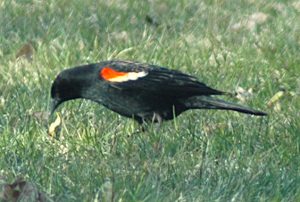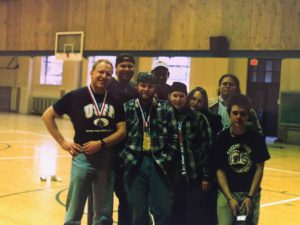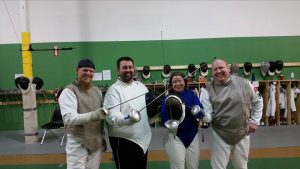
Among my many careers, I was a fencing portrait photographer. The following are photos I used as advertising and pose options. I own the copyright to all of them, so please don’t steal them, without permission.
Latching the floor cord to the D-ring just above Jill’s left hip, Dan took a moment to appreciate that he was standing in her shoes only 20 short years earlier.
When Jill finished plugging in her favorite electric foil that she named Annibelle the Cannibelle, she rushed to get to her en garde line and start the final bout of the women’s national foil tournament.
Seeing her haste, Dan grabbed her wrist and pulled her back to him.
The 18-year-old was bright and smiling from the joy of fencing for the title, but Dan could also see the nervous tension around her eyes. He had butterflies in his stomach, but he didn’t show it.
Placing his hands on her shoulders, he looked deeply into her brown eyes for a second before speaking.
“It feels just like yesterday that I was teaching some skinny little 11-year-old girl how to kick the asses of 2 17-year-old boys twice her size.”
She exhaled a laugh, and the tension left her face. “If they could see me now.”
“They’d shit their pants and be grateful you didn’t kill them.”
She laughed, again.
Now that her nerves were steadied, Dan helped her focus: “Don’t think about the title. Only think about the touch in the moment.”
She nodded.
“How are you going to beat this girl?”
“First, I’m going to figure out how the director calls right-of-way. Then, I’m going to test her distance, comfort zone and weaknesses.”
“Good,” Dan encouraged. “What else?”
“Fence for only 1-light touches. There’s no trusting the call on double-light actions,” Jill replied. “Oh, and listen to her coach give away her strategy.”
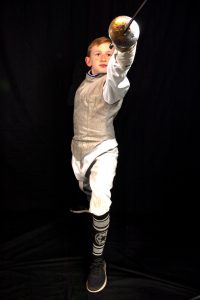 “Excellent,” he said. “What do you do if your attacks stop working?”
“Excellent,” he said. “What do you do if your attacks stop working?”
“Play defense.”
“And if your defense isn’t working?”
“Go on attack.”
“Perfect,” he said. “So, in other words, this is just a normal bout for you.”
She nodded.
“Good. Just keep in mind one more thing. Give yourself a little extra space until you know her reach and abilities. Never hesitate. You have the best instincts in the game. Trust yourself.”
“Got it, Coach.”
“Good. Stay grizzly.”
She gave him a low, menacing growl with a lop-sided grin.
He winked back at her. “You’re ready. Go kick her ass.”
Jill turned on her heel and strode confidently to her en garde line, her sweaty brown pony tail swaying with each step.
He watched her from the coach’s box like a proud father. Jill was not his daughter, but she had become very much like the daughter he never had.
***
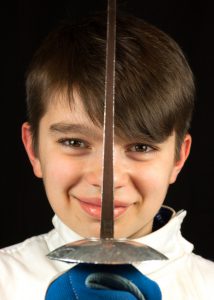 Upon winning the silver medal at the national championship, Dan was more determined than ever to take home the gold. He trained like a man possessed. He won countless tournaments and defeated many world-class competitors, but, at the following national foil championship, he failed to make the semi-finals.
Upon winning the silver medal at the national championship, Dan was more determined than ever to take home the gold. He trained like a man possessed. He won countless tournaments and defeated many world-class competitors, but, at the following national foil championship, he failed to make the semi-finals.
And so he would preserver in the years to come. Through bad romances and good, economic boom times and bust, his love of fencing never wavered. Back in college, he assumed adulthood would be glamorous. With a professional career would come professional paychecks that would finally pay for the travel and gear that he could not afford in college.
What he did not count on was that a professional career also required far more time out of his day. The more he succeeded at work, the less time he was able to devote to training. While he remained one of the most gifted naturals in the sport, the general effects of age and the inability to train and travel as much as in college cost him his dream of a national title.
Still devoted to the sport and fly-over country, Dan began helping out more at a local park district club, like where he first learned.
Fencing had changed over the years from a mostly adult sport to a mostly kid sport. On the circuit, 12-year-olds just getting into the sport were practically too old to have a chance. The kids who started at age 8 were nationally rated and winning major circuit events by age 12.
Teaching had moved on from classical fencing where students were taught all of the moves until they learned each to perfection and also taught how to think and react under pressure to teaching kids a few basics and then one or two power moves. The power moves were dominant and won tournaments, but the kids knew nothing else and became proud and arrogant in their ignorance.
Most flicking had been eliminated from the sport by stiffening the foil blades, but directors still based their calls almost entirely on footwork, regardless of the way the rules remained written.
Poor sportsmanship was promoted to appalling levels. Dominate young fencers were encouraged as young as 9 to create their own victory dances and war whoops after every touch scored. The days of fencers winning and losing with stoic grace, dignity and honor were long dead.
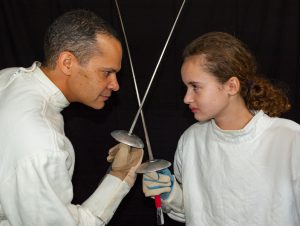 As Dan began teaching kids, he taught them the old ways. Realizing 90% of the kids he taught were only interested in living out their pirate and Jedi fantasies, he had fun with them, adding more advanced classes for the kids that actually wanted to learn something and try competition.
As Dan began teaching kids, he taught them the old ways. Realizing 90% of the kids he taught were only interested in living out their pirate and Jedi fantasies, he had fun with them, adding more advanced classes for the kids that actually wanted to learn something and try competition.
Dan didn’t remember meeting Jill. She was just another scrawny 11-year-old who was rather shy and quiet. He never really took notice of her until he noticed two of his nearly grown high school students going way too rough on her in the advanced class.
“What on earth are you guys doing over there?” Dan called out across the gym. He left the two younger kids he was helping.
One of the older boys stammered, “She wanted to fence us. She said for us not to go easy on her.”
Dan looked at him doubtfully and asked the girl.
“It’s true,” she agreed enthusiastically. “I’m tired of beating everybody else in the club. These are the only guys I can’t beat, and I want to learn what they’re doing that I can’t beat.”
“You mean you’re beating all of the other students?” he asked doubtfully.
“Haven’t you noticed?” she asked, hurt in her big, brown eyes.
Dan felt horribly because he hadn’t.
“Aren’t these guys hurting you?” he asked.
“Yeah, but it is the only way to see what they are doing so I can beat them.”
Dan looked at her thoughtfully, as she gazed up earnestly. Dan placed a hand on her shoulder and turned her away from the boys, and they walked a few steps.
Squatting in front of her he whispered, “You can’t beat them fencing them like they fence you. You’re too small.”
“I hate being little,” she said. “I can’t wait to grow up.”
“Are you kidding me?” Dan asked. “Being small and fast are the two best things for a fencer to be.”
“No, they’re not,” she dismissed him.
“Yes, they are. You have no target area to stab when you’re small,” he said. “Put your foil down and go en garde.”
She did, and, crouching down to her level, he went en garde, extended his right arm and index finger, gently poking her leading right shoulder.
“Now, extend your arm and finger.”
She did, poking him in the bicep.
“Who is going to win this fight this way?”
“You are,” she said.
“Now, how are you actually going to beat me?”
Jill thought a second and cautiously bent her arm, parried Dan’s arm—which he kept rigid—, stepped closer to him, resting his straight arm across her belly, extended her arm and finger and poked him in the right shoulder.
“Very good,” he said, genuinely impressed, as he stood back up. “You made yourself safe from the tip of my foil and put yourself in a position to stab me repeatedly with impunity. Go over there and kick those boys’ butts.”
Jill smiled and ran back to her en garde line.
Dan stood in the director’s position and loudly told the boys, “I want you to fence your best against Jill and not give her any easy touches. BUT, you also can’t fence to hurt her. There is no reason at your size and skill level that you can’t beat her without ever letting her get close enough to you that you even accidentally leave a mark.”
One of the boys volunteered to go first. Jill scored the first two touches and was beaming at Dan. She then lost 5-2, when the boy changed tactics. Still, that first boost of confidence was there and Jill dug in. At the end of a month, she was an even match against the older boys. At the end of two months, she dominated the boys, who were now taking special instructions from Dan on how to beat her.
Dan added more classes for the kids who wanted to go even further in competition. Plenty of boys and girls signed up, and the group gelled as a team, working together to always get better.
Over the years, several qualified for the national tournament.
Jill had been qualifying since she was 13. Now, at 18, she had gone as far into the championship as her coach, who was barely competing and mostly focusing on his students.
***
 Jill snapped a sharp salute with earnest intensity, as her coach had before her.
Jill snapped a sharp salute with earnest intensity, as her coach had before her.
When the director said go, both women rushed forward.
Jill’s much taller opponent suddenly dropped down with perfect poise and form, scoring a touch on Jill’s 8, just below her sword-arm elbow.
Jill replayed the move in her head. For as surprising and perfectly executed as the move was, Jill noticed the woman’s hips seemingly unhitch, as if she were double jointed. Then the opponent kicked with her front leg and pushed off her back leg, extending it completely until the contours of her left calf and thigh lay flat on the floor, her left bottom cheek smacked the floor and her right thigh angled up to her knee positioned directly over a shin that was perpendicular to the floor. The competitor’s torso was erect, right arm straight as an iron rod that was holding a 35-inch long foil. This woman gracefully covered 10 feet of ground from her back foot to the tip of her foil.
The entire maneuver didn’t take more than a second to execute. When her back side tapped the floor, it gave her the momentum she needed to pop back up into en garde.
Before the director called the point in her favor, the woman unleashed an ear-shattering, primal shriek of a victory cry.
Jill’s parents looked at Dan from the stands, mortified. Neither they nor most of the audience had ever seen a fencer move like that and sound so intimidating.
Dan nodded reassuringly to them.
“Taylor Swift!” is all he shouted to Jill.
Jill performed a little hand-flicking dance move from the “Shake It Off” video, as she reset herself on the en garde line.
Given how closely they listened to opposing coaches screaming and yelling at their fencers, Dan only spoke in code to his fencers at tournaments. He taught them to think and act for themselves. Jill’s little dance move told him she’d seen the woman’s hips unhitch and that she knew what to do.
When fencing resumed, both women rushed off the line. Two steps in, Jill stopped as the other woman’s hips unhitched. Jill waited for what felt like an eternity, as she let her opponent overcommit to the attack. Once the shrieker’s arm was extended, Jill swept down for an almost clumsy parry 8, riposting for a touch in the middle of the opponent’s chest.
Jill was soundless and expressionless, her actions were more intimidating than any screaming.
Dan clapped three loud, rapid times, indicating nice touch. Get back to work.
Jill’s opponent looked back at her coach a little nervously. Nobody had previously denied her the long-lunge touch in 8. Jill heard him tell her to switch attacks, and she knew what was coming.
When her opponent rushed her, sword windmilling counter clockwise, Jill waited, feigned a parry, retreated a couple steps and picked off the attack with ease, riposting and then parrying one last time to guarantee 1 light.
2-1 Jill.
Clearly, this was the shrieker’s second favorite attack, as she did it again. Jill easily defeated it.
3-1 Jill.
The attack came again, but this time Jill skipped a step in her defense. The opponent landed and shrieked.
3-2.
“Don’t get overconfident,” is all Dan told Jill.
Emboldened, the shrieker renewed her efforts with the same attack. Jill recovered her form and defended it easily.
4-2.
Not willing to believe Jill, of Fly-Over Country, could beat her special moves, the opponent asked the director if she could test her foil on Jill. Both acquiesced, and the equipment worked perfectly.
The opponent’s coach was furious with the shrieker, yelling at her to change the direction of the attacks.
The shrieker tried three more attacks from the opposite direction. Jill was waiting for them, and when the first 3-minute period of play came to an end, she was up 7-2.
Jill swaggered over to her coach for the 1-minute break.
“Stop right there!” he reprimanded, handing her her favorite sports drink. “You’ve got nothing to strut about, yet. Right now her coach is plotting your demise, and she didn’t get this far by giving up. What do you think he’s telling her?”
“Play defense,” Jill said, sobering up.
“Right,” Dan said, softening.
“What should I do?”
“Well, do you want to try winning by risking running the time out or by mopping the floor with her dirty-blonde head?”
“Mopping,” she said, with a grim set to her jawline.
“Give her a dose of her own medicine. Finish her off before this period ends. Don’t give her time to think.”
The director called the end of the break.
Jill took a last swig.
“If you’re in such a hurry, old man, you better start filling that bucket with soap and water,” she called back to him, making her way to her en garde line.
Dan loved her moxie, but he hoped it wasn’t overconfidence.
When he saw Jill blaze across the strip, windmilling and flicking with a hard shot to the stomach, he knew Jill was focused and playing for blood. 8-2.
The next attempt had her opponent ready. Another shriek and it was 8-3.
“You’re a shark,” Dan shouted, letting Jill know she froze her feet at the end of her failed attack. After all, sharks and fencers have one thing in common, when they stop moving, they die.
Re-invigorated by the parry-riposte touch she just earned, Jill’s opponent went back to her own windmill attack. Jill was waiting for it. 9-3.
“Crazy Monkey!” Dan called out.
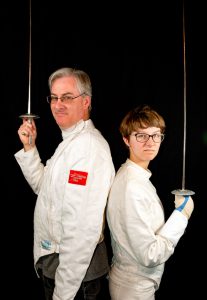 The Crazy Monkey attack was Jill’s own invention. It took the windmill attacks that were so popular to a whole new level. She could land the tip on all four corners of the body and on the back by windmilling, which all top fencers could do. Her special ability was to keep moving forward and reversing the windmill in a heartbeat while also stutter-stepping to throw off the timing of the attack…or more specifically, throwing off the timing of the defense, allowing Jill enough time to pick where she wanted to most safely land. To make it harder to defend, Jill would also change her height from normal to low to up on her tip toes, never stopping forward progression and losing right-of way. It was extremely difficult to parry, until you got used to it.
The Crazy Monkey attack was Jill’s own invention. It took the windmill attacks that were so popular to a whole new level. She could land the tip on all four corners of the body and on the back by windmilling, which all top fencers could do. Her special ability was to keep moving forward and reversing the windmill in a heartbeat while also stutter-stepping to throw off the timing of the attack…or more specifically, throwing off the timing of the defense, allowing Jill enough time to pick where she wanted to most safely land. To make it harder to defend, Jill would also change her height from normal to low to up on her tip toes, never stopping forward progression and losing right-of way. It was extremely difficult to parry, until you got used to it.
Jill’s opponent fought with desperation, hypnotized by Jill’s elusive foil point that connected with her again and again.
It was 12-3 now, and Jill was so locked into the zone, she couldn’t hear the spectators. She could barely hear the director. She couldn’t even hear Dan.
As she began running down her opponent on the next action, she noticed the woman backing up far earlier than previously. That’s when she spotted the woman unhitching her hips.
Although it wasn’t what she planned on in her attack, Jill was so focused, she didn’t hesitate to press on, sweep a parry 8, bind her opponent’s blade and throw the entire weapon out of her opponent’s hand before dropping in to lunge dead center on the shrieker’s sternum.
Jill held her lunge for effect, and her opponent stood dumbfounded.
The crowd roared at the thrill of the site. 13-3.
Jill was so focused, she didn’t hear the crowd. She didn’t hear the director. She stalked back to her en garde line, lost in her own thoughts of strategy.
Dan saw it the instant the foil flew out of the hand of the woman across from him.
Jill didn’t see it until after resetting en garde. As her tall adversary tugged at the body cord by her hip to pull her foil back to her hand, Jill could tell she had broken her opponent’s spirit.
For a true warrior, it is both a beautiful site and a little sad. It is fun to be a lion and take down a wildebeest. Yet, there is little joy in putting down a whimpering wounded animal.
“Stay grizzly,” Dan warned. Jill looked back and growled. All he could see were big white teeth behind her black-mesh mask.
Jill made solid attacks that were responsibly cautious, given that her rival was no longer putting up much of an obvious fight. It was quite anti-climactic.
When the director awarded Jill the 15th touch, Jill trotted back to her line, gave a sincere, crisp salute and walked up to her opponent for a customary handshake and whispered, “Good game.”
To the dismay of the fencing officials, Jill never shouted, danced or screamed. She didn’t need to rub it in, as her opponent wept at the side of the strip.
Wearing the biggest grin he had ever seen, Jill swaggered back to her coach, joy radiating. He offered her his customary high five, and she wrapped him in a bear hug.
He hugged her back, picked her up and swung her around. They were then mobbed by her family and teammates.
After the awards and photos, when things started to calm down, Dan asked to hold her medal.
He looked over the enameled front and read the inscription on the back. It wasn’t real gold, but he stared at it wistfully, as he hefted it.
“Thank you,” Jill said. “I never could have done it without you.”
“Nonsense,” he said, looking up at her with a wan smile. “All I said were silly things like ‘Be a shark,’ and “Taylor Swift.'”
“No,” she softly protested. “You took me all the way to the finish line.”
He shook his head. “I shined a flashlight down the path for you. You did all of the work, and I couldn’t be more proud of you.”
She attempted to say something, but Dan held up his hand to stop her.
“I’ve been chasing this damned thing all my life,” he said, as he gently placed the ribbon back around her neck. “And I have to admit that it makes me ten times happier to see it on you than on me.”
AUTHOR’S NOTE: I also never coached any national champions. The passion, strategy, changes and sensations in this story are all true. Fencing has given me 25 years of joy, which I hope I passed on to my students…and maybe you, with these stories. In the event you want to learn, you are never too old to start. Although I’m taking a break from the sport for a little while, I hope to be fencing into my 70s, like my mentor, the great Jack Warner of Spokane, Wash., not Hollywood. If he is still with us today, he’d be about 95 or so years old. Yet, at age 70, with 50 years of fencing under his belt, he’d mop the floor with us cocky 20-somethings who foolishly believed their youth would destroy his experience and strategy. Special thanks goes out to him, Blue-Hair Cathy, Maria D. and Bakhyt for teaching me so much as a competitor and Tracy for teaching me so much as a coach…and to all the many other wonderful friends, teammates and students along the way. It might not sound possible, but you are all the best.



 Shopping Cart
Shopping Cart





